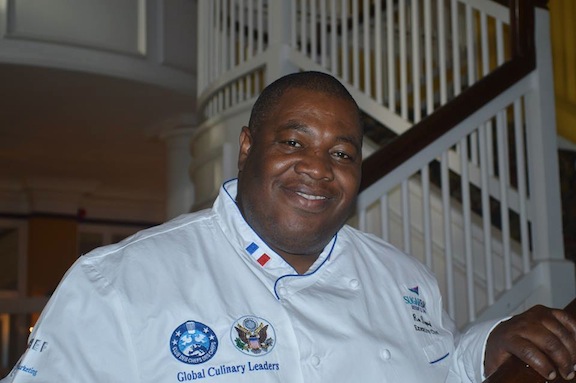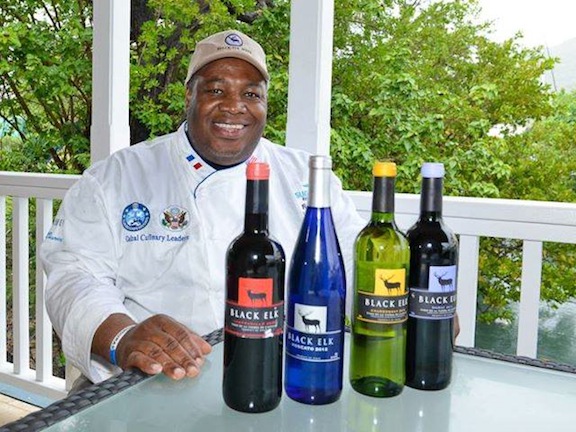Above: Chef Ron Duprat
A native of Haiti, Chef Ron Duprat has quickly become one of the best-known Caribbean-born chefs in the world, most notably as a competitor on season six of Bravo’s Top Chef television series. Duprat, has remained a strong advocate for his home country, working for what he calls a a “sustainable food” movement in Haiti and, most recently, as an ambassador for Black Elk Wine in the Caribbean and as a culinary ambassador for the US Department of State. To learn more, Caribbean Journal talked to the Chef about his latest work and his passion for Haiti.
What have you been working on lately?
I’m currently working on many exciting projects — including enhancing operational practices and staff performance in the restaurants Pimentos, Manor House and Blue Currents, along with the Tapiaki restaurant, Chefs of the Caribbean at the Miami International Airport, my TV shows, a new book and Poupouche. My plan is not to take on more projects to enhance my overall performance as a chef and humanitarian.
You’ve been an advocate for what you call a “sustainable food future” in Haiti. What do you mean by that?
A “sustainable food future” means that Haiti must reduce its reliance on imports in favour of local production. As is the practice of every country in the world, Haiti must turn away from its 30+ year support of imports in favour of making actual use of its existing assets, and making use of its traditional and experienced agricultural labour force and 700,000 hectares of arable lands to reduce high rates of food insecurity. Such policies will also result in job creation for Haiti’s 2/3-majority farming labour force.
What are the solutions for doing that?
The solutions are strategic investments in agro-development and agro-industrial production to extend the shelf-life of its food production when applicable. Some of those investments include those to increase agricultural yield or food production and to improe the distribution chains, which will allow food to reach more people while resulting in reduced prices and job creation. Every policy decision from both the government of Haiti and Haiti’s international partners must be seamlessly improved toward sustainable food production.
How do you think Haitian cuisine has been developing in recent years? Is there a greater awareness of it outside of Haiti?
Wow. Haitian cuisine is always the experience of a lifetime. There are so many Haitian chefs now pushing the envelope to create a “no-limit” Haitian gastronomy. It’s no longer rice and beans. Haiti’s national culinary team has led the evolution so much at events like Taste of the Caribbean and Taste of the Islands. I’ve worked in some of the most prestigious clubs and resorts in the US, where Haitian was literally nonexistent. Prior to me showcasing on shows like Top Chef, Iron Chef, Bar Rescue and Gone Fishing, a lot of Haitian chefs were only associating themselves with the Bahamas and Jamaica, and anywhere else. Even at that time, there were so many Haitian chefs that came to the US who didn’t know much about Haitian cuisine. While some local establishments and chefs have captured international notoriety, the region has struggled to position itself as a culinary destination. But if you go to some of the five-star restaurants or Michelin-starred restaurants in the US, you find a lot of Haitian chefs or cooks, like at Prime 112 or the Delano Hotel in Miami. I just came back from Central America, and I was amazed to see how many restaurants offered Sauce Timalice, Blanc Manger, fried pork on their menus, even at places that weren’t considered Haitian restaurants.
Haiti has been looking to develop its tourism sector — what do you think about that?
Haiti is “La Perle des Antilles.” With so many new hotels, better security and new tourists coming ot Haiti, I am hoping that more cruise ships can come to Haiti and crate more tourism jobs. It’s important to underline that there have been thousands of sustainable tourism initiatives and projects carried out by Haitians and international organizations.
Can food play a role in that?
It’s my dream to see Haiti as the number one culinary destination in the Caribbean.
Do you have a favourite destination in Haiti?
Yes, I have a few — Cotes des Arcadins, Gelee Beach, Les Cayes and Abaka Bay, Ile a Vache.
You’re now an ambassador for Black Elk Wines. Can you talk about that?
The Black Elk programme is a line of premium varietal wines, from different world growing regions – and all packaged under the same Black Elk brand moniker. These are wonderful (and representative) premium varietal wines, beautifully packaged, and a very “user friendly” multi-country wine brand.
Caribbean cuisine in general seems to have been growing in influence worldwide. Why do you think that is?
Well, the Caribbean is a gem, with so many talented chefs. If you take a chef like Mitchell Husbands (at the Nonsuch Bay Resort) or Chef Mark Smith, the Antiguan Chef of the Year, or Chef Travis Phillips, Caribbean chefs are pushing the envelope and going above and beyond tourists and foodies’ expectations.

